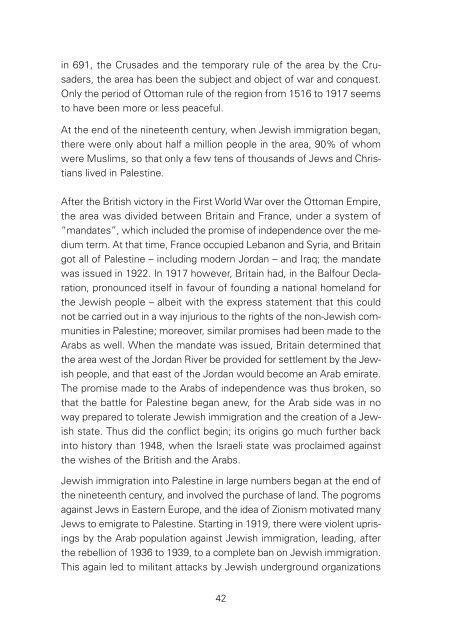The Contribution of Women to Peace and Reconciliation
The Contribution of Women to Peace and Reconciliation
The Contribution of Women to Peace and Reconciliation
You also want an ePaper? Increase the reach of your titles
YUMPU automatically turns print PDFs into web optimized ePapers that Google loves.
in 691, the Crusades <strong>and</strong> the temporary rule <strong>of</strong> the area by the Cru -<br />
saders, the area has been the subject <strong>and</strong> object <strong>of</strong> war <strong>and</strong> conquest.<br />
Only the period <strong>of</strong> Ot<strong>to</strong>man rule <strong>of</strong> the region from 1516 <strong>to</strong> 1917 seems<br />
<strong>to</strong> have been more or less peaceful.<br />
At the end <strong>of</strong> the nineteenth century, when Jewish immigration began,<br />
there were only about half a million people in the area, 90% <strong>of</strong> whom<br />
were Muslims, so that only a few tens <strong>of</strong> thous<strong>and</strong>s <strong>of</strong> Jews <strong>and</strong> Christians<br />
lived in Palestine.<br />
After the British vic<strong>to</strong>ry in the First World War over the Ot<strong>to</strong>man Empire,<br />
the area was divided between Britain <strong>and</strong> France, under a system <strong>of</strong><br />
“m<strong>and</strong>ates”, which included the promise <strong>of</strong> independence over the medium<br />
term. At that time, France occupied Lebanon <strong>and</strong> Syria, <strong>and</strong> Britain<br />
got all <strong>of</strong> Palestine – including modern Jordan – <strong>and</strong> Iraq; the m<strong>and</strong>ate<br />
was issued in 1922. In 1917 however, Britain had, in the Balfour Declaration,<br />
pronounced itself in favour <strong>of</strong> founding a national homel<strong>and</strong> for<br />
the Jewish people – albeit with the express statement that this could<br />
not be carried out in a way injurious <strong>to</strong> the rights <strong>of</strong> the non-Jewish communities<br />
in Palestine; moreover, similar promises had been made <strong>to</strong> the<br />
Arabs as well. When the m<strong>and</strong>ate was issued, Britain determined that<br />
the area west <strong>of</strong> the Jordan River be provided for settlement by the Jew -<br />
ish people, <strong>and</strong> that east <strong>of</strong> the Jordan would become an Arab emirate.<br />
<strong>The</strong> promise made <strong>to</strong> the Arabs <strong>of</strong> independence was thus broken, so<br />
that the battle for Palestine began anew, for the Arab side was in no<br />
way prepared <strong>to</strong> <strong>to</strong>lerate Jewish immigration <strong>and</strong> the creation <strong>of</strong> a Jew -<br />
ish state. Thus did the conflict begin; its origins go much further back<br />
in<strong>to</strong> his<strong>to</strong>ry than 1948, when the Israeli state was proclaimed against<br />
the wishes <strong>of</strong> the British <strong>and</strong> the Arabs.<br />
Jewish immigration in<strong>to</strong> Palestine in large numbers began at the end <strong>of</strong><br />
the nineteenth century, <strong>and</strong> involved the purchase <strong>of</strong> l<strong>and</strong>. <strong>The</strong> pogroms<br />
against Jews in Eastern Europe, <strong>and</strong> the idea <strong>of</strong> Zionism motivated many<br />
Jews <strong>to</strong> emigrate <strong>to</strong> Palestine. Starting in 1919, there were violent upris -<br />
ings by the Arab population against Jewish immigration, leading, after<br />
the rebellion <strong>of</strong> 1936 <strong>to</strong> 1939, <strong>to</strong> a complete ban on Jewish immigration.<br />
This again led <strong>to</strong> militant attacks by Jewish underground organizations<br />
42








